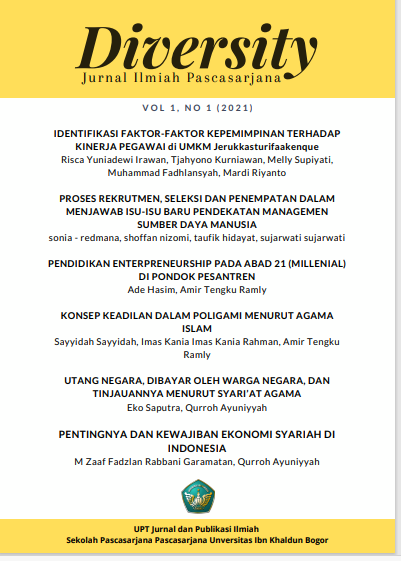KONSEP KEADILAN DALAM POLIGAMI MENURUT AGAMA ISLAM
DOI:
https://doi.org/10.32832/djip-uika.v1i1.4360Abstrak
This article focuses on the discussion of the Kagian Islam on justice in polygamy, namely; what are the requirements for polygamy according to the priests of the mazhab, how the arguments and laws of the priests of the mazhab allow polygamy, and how is it relevant to polygamy according to the contemporary context in Indonesia. This research is a library research (Library Reserach), which is a method of collecting data such as the books of the priests of the mazhab and books that are relevant to the issues discussed. This research is a descriptive analysis, which describes, studies and analyzes the opinions of the Imam of the Schools in terms of being fair in polygamy. The results showed that in Islam it is permissible for a husband to practice polygamy on the condition that he believes or has a strong suspicion that he is able to do justice to his wives. as indicated by the al-Qur'an in the letter al-Nisa "verse 3:" then if you are afraid that you will not be able to act fairly, then marry only one wife ". This permissibility for polygamy is not a recommendation but one of the solutions given in special conditions to those (husbands) who really need and fulfill certain conditions. The meaning of justice as a condition for polygamy is not in the inner meaning of justice (such as love and affection) but justice for things that are material and measurable. As indicated by verse 129 of the letter al-Nisa 'and the sociological background because of the verse polygamy (verse 3 al-Nisa'). What is meant by the fairest distribution is in terms of: income, clothing, place to live, and time of turn
Referensi
al-Bantaniy, Syekh Nawawi, Nihayatu al-Zain, Surabaya: al-Hidayah, tt.
al-Bujayramiy, Syekh Sulayman, Bujayramiy ‘Ala al-Khothib, Jilid 3, Beirut: Dar al-Fikr,1401H/1981M
Al-Jurjawi, Ali Ahmad, Hikmah al-Tasyri' wa Falsafatuhu, Beirut: Dar al-Fikri, tt Nuruddin, Amiur dan Tarigan, Azhari Akmal, Hukum Perdata di Indonesia, Jakarta: Pernada Media,2004
al-Malibariy, Syekh Zainuddin bin Abdul Aziz, Fathu al-Mu'in, terj. Abul Hiyadh, Surabaya: Al- Hidayah, 1993
al-Qolyubiy, Syihabuddin dan ‘Umayroh, Syihabuddin, Hasyiyatani (Qolyubiy-‘Umayroh), Surabaya: al-Hidayah, tt
Azizah, Uswatun, Skripsi Studi Komparatif Antara Pemikiran Muhammad Abduh dan Muhammad Syahrur Tentang Poligami, Yogyakarta: UIN Sunan Kalijaga Yogyakarta, 2006
Departemen Pendidikan Nasional, Kamus Besar Bahasa Indonesia, Edisi IV. Cet. I; Jakarta: PT. Gramedia Pustaka Utama, 2008.
Doi, Abd. Rahman I, Penjelasan Lengkap Hukum-Hukum Allah (Syari'ah), Jakarta: Rajawali Press, 2002
Doi, Abd. Rahman I, Perkawinan dalam Syari'at Islam, pen. Basri Iba Ashgari dan Wadi Isturi, cet. Ke-I, Jakarta: PT Rineka Cipta, 1992
Engineer, Asghar Ali, Pembebasan Perempuan, Yogyakarta: LKIS, 2003
Setyaningsih, Eko Eni, Skripsi Poligami dalam Perspektif Hukum Islam di Indonesia dan Hak Asasi
Haroen, Nasrun, Ushul Fiqh 1, Jakarta: Logos Wacana Ilmu,1997
Haswir dan Nurwahid, Muhammad, Perbandingan Mazhab, Realitas Pergulatan Pemikiran Ulama Fiqih, Pekanbaru: Alaf Riau, 2006
Ibn Fa>ris bin Zakariyya>, Abu> al-H{usain Ah{mad. Mu‘jam Maqa>yi>s al-Lugah, Juz. IV. Beirut: Da>r Ittih{a>d al-‘Arabiy, 1423 H/2002 M.
Labib MZ, Pembelaan Ummat Manusia, Surabaya: Bentang Pelajar, 1986
Manusia, Yogyakarta: UIN Sunan Kalijaga, Yogyakarta, 2007
Nasution, Khoiruddin, Riba dan Poligami; Sebuah Studi atas Pemikiran Muhammad Abduh, Jakarta; Pustaka Pelajar, 1996
Nurdin, Asep, Hadis-hadis Tentang Poligami (Studi Pemahaman Hadis Berprespektif Jender),Yogyakarta: UIN Sunan Kalijaga, 2003
Syaikh Kamil Muhammad ‘Uwaidah, Fiqih Wanita, Jakarta: Pusataka Al-Kautsar, 1998
Yunus, Mahmud, Hukum Perkawinan Menurut Mazhab Syafi'i, Hanafi, Maliki, Hanbali, Jakarta : Hidakarya Agung, 1990







